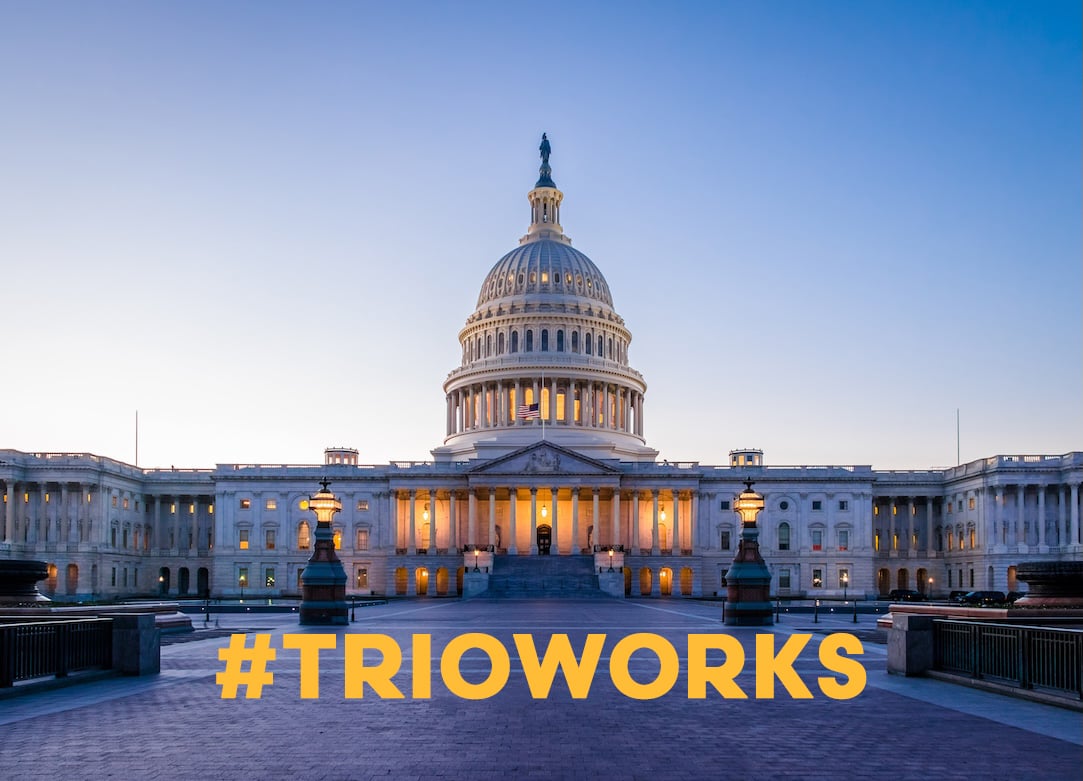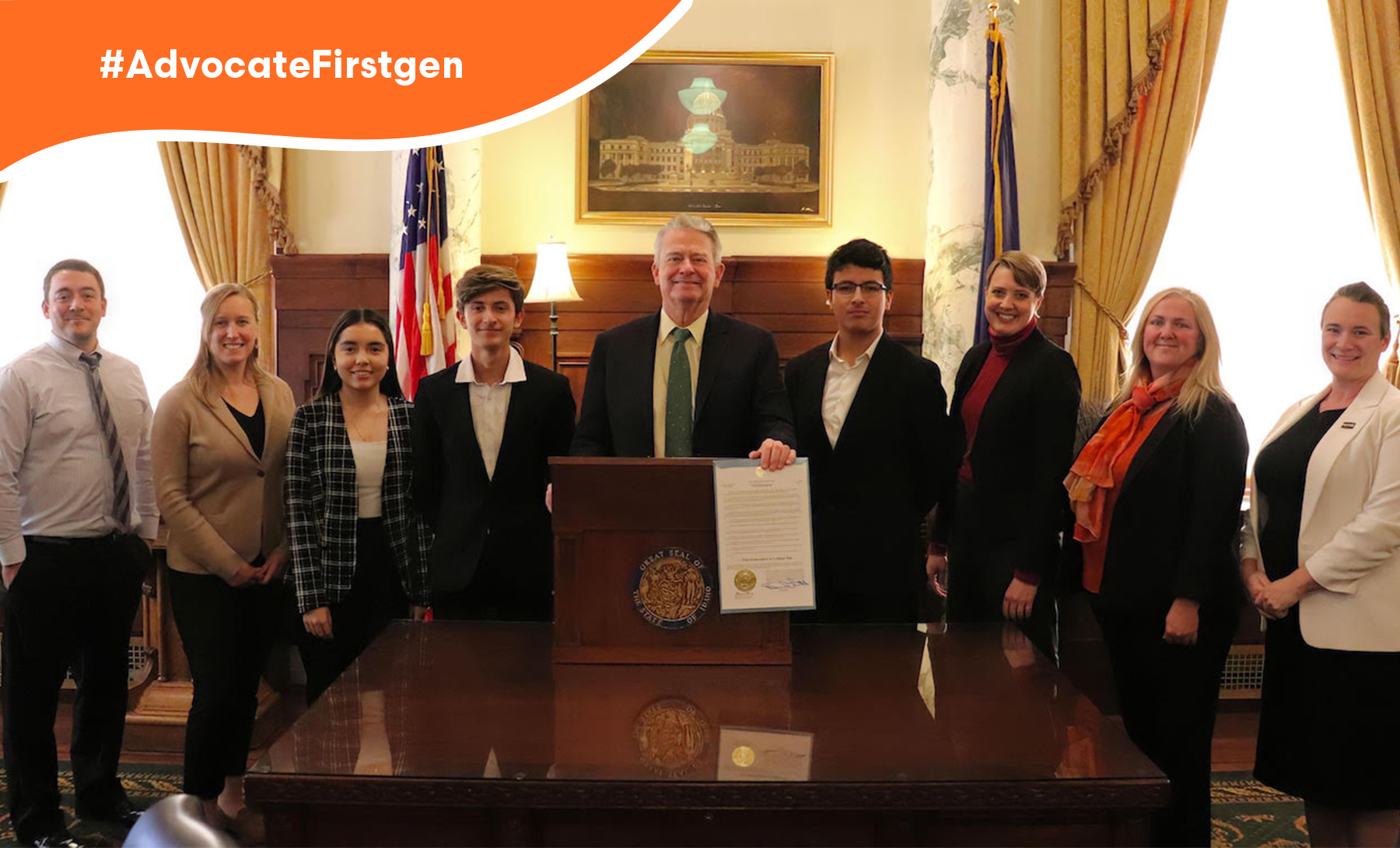by Stephanie J. Bannister, Ph.D.
Vice President, FirstGen Forward Network
FirstGen Forward
Today, TRIO programs face potential federal budget cuts that could dismantle these life-changing supports. At a time when college degrees are more critical—and more difficult to attain—for first-generation and low-income students, we need to support and strengthen TRIO rather than abandon it.
If you're reading this, you already know that #TRIOWorks. But what makes it work—and why is it still so often overlooked?
After nearly two decades in student affairs, I stepped into a new role overseeing student success initiatives, including TRIO. Until then, I’d only seen Upward Bound students on campus in the summer. I didn’t realize that TRIO was transforming lives year-round.
This limited exposure isn’t uncommon and can often be part of the problem. Across campuses nationwide, TRIO programs often operate quietly, yet their impact is genuinely transformative.
TRIO: The Unsung Forerunner of Student Success
TRIO programs—like Upward Bound, Talent Search, and Student Support Services—are more than longstanding federal initiatives; they are the original incubators of student success strategies. Grounded in evidence-based practices, guided by a culture of rigorous assessment, and backed by decades of proven outcomes, TRIO has consistently delivered results.
But TRIO’s most transformative power lies beyond data. It’s in the sense of belonging, the consistent mentorship, and the culturally attuned care that students receive, often for the first time in their educational journey.
In my role as Vice President of the First-gen Forward Network, which partners with over 400 colleges and universities nationwide, I’ve seen this truth play out time and again: the foundation for first-generation student success often begins with TRIO. Personally, my time supporting TRIO professionals reshaped how I think about being “student-ready.” TRIO doesn’t just provide support—it cultivates resilience, identity, and empowerment.
That’s why FirstGen Forward builds on this legacy. We work alongside institutions that are committed to reimagining what student support looks like, especially for those whose parents never earned a four-year degree. First-gen students are one of the fastest-growing demographics in higher education, and over the past decade, their college application rates have doubled. But access alone isn’t enough.
The numbers are sobering: only 24% of first-gen students earn a bachelor’s degree, compared to 59% of their continuing-generation peers. Nearly half leave college without a credential, risking both their dreams and their economic mobility.
TRIO helps close this gap. It is the launchpad for upward mobility and a valuable use case for what student success can and should look like.
Imagine, then, what we stand to lose if Congress and the President adopt a federal budget that strips funding for TRIO. In a time of seismic shifts—changing student demographics, evolving workforce demands, and growing questions about the value of higher education—we need bold investments, not budget cuts.
Now is the time to protect and elevate what works. #TRIOWorks. And our nation’s future depends on it.
The Proof Is Personal
To bring the story of TRIO’s impact to life, I asked two of my colleagues at FirstGen Forward—both TRIO alumni and current national leaders—to share how these programs transformed their lives and careers.
Dr. Jennifer Sutton, Expert Guide, FirstGen Forward
“I’m a proud biracial Latina from South Texas, raised in a rural border town. My mother, widowed and the first in our family to graduate from high school, earned an associate’s degree in bookkeeping. She taught me the value of education. TRIO taught me how to get there.”
Dr. Sutton joined Upward Bound as a high school freshman and later participated in the Upward Bound Math & Science Regional Center. She also shared how this experience sparked change beyond her own story:
“Because of TRIO, I helped six of my cousins pursue postsecondary education. Now we all have better jobs—and we’re helping break the cycle of poverty in our family.”
These experiences led her to the University of Texas at Arlington, where she continued her involvement in TRIO through the Summer Bridge and Student Support Services programs.
“TRIO didn’t just support me through college. It launched a career. Over the past 20+ years, I’ve led TRIO and HSI programs that have touched thousands of students’ lives across Texas and the nation. TRIO changed the course of my life—and my family’s future.”
That’s the TRIO multiplier effect: one student supported, many lives changed.
Dr. Martina Martin, Assistant Vice President for Network Success, FirstGen Forward
“Before college even started, I got a letter in the mail. I didn’t fully understand what it was, but it promised help if I needed it. So I said yes.”
That “yes” led Dr. Martin to Student Support Services (NOVA) at Eastern Kentucky University. When she struggled in College Algebra, TRIO staff and tutors gave her more than academic help—they gave her confidence and strategy.
“That semester taught me how to persist. TRIO helped me realize that asking for help isn’t weakness—it’s wisdom. I graduated with honors, went on to earn a Ph.D., and today, I lead programs that support first-gen students across the country.”
From undergraduate algebra to a Ph.D.—TRIO helps students realize they belong in higher ed.
What Makes TRIO Work
At FirstGen Forward, we know that #TRIOWorks—and here’s why:
- Bridges the gap between college access and degree completion.
- Fosters a sense of belonging, validation, and culturally responsive advising.
- Delivers early intervention, intentional advising, and sustained support to increase graduation rates.
- Empowers students to break the cycle of generational poverty and achieve upward mobility.
- Provides tailored support for students with disabilities, financial need, and first-gen status.
The result? More graduates. Stronger communities. Economic vitality. And a stronger nation.
"Across campuses nationwide, TRIO programs often operate quietly, yet their impact is genuinely transformative."
The Economic Case for TRIO
College graduates earn significantly more over their lifetimes than those with only a high school diploma. That income gap translates into:
- Higher tax contributions
- Increased consumer spending
- Greater financial stability
TRIO keeps students enrolled, progressing, and graduating—protecting educational investments and multiplying returns. TRIO programs help build strong, resilient families that contribute to vibrant communities by preparing talented individuals to enter the workforce.
TRIO Is a Pipeline
TRIO isn’t just a set of programs. It’s a pipeline to education and opportunity.
At a time when higher education is under pressure to prove its value and demonstrate impact, TRIO continues to deliver results quietly, effectively, and consistently.
But TRIO can’t continue to do this work in silence. We need the support of the President, Congressional leadership, and higher education leadership to protect, invest in, and elevate these programs. This investment and support will benefit businesses and communities alike. Because when students succeed, so do their communities—and so does our nation.
Let’s say it louder—and demand action.
#ProtectTRIO. It’s not a charity. It’s infrastructure. It’s an economic investment. It’s our future.
#TRIOWorks. And it always has.
🔁 Please share your own TRIO story or tag someone who’s helped show you that you belong in higher education.
📢 To policymakers, educators, and leaders: If you're looking for a proven strategy to advance equity, start here.



